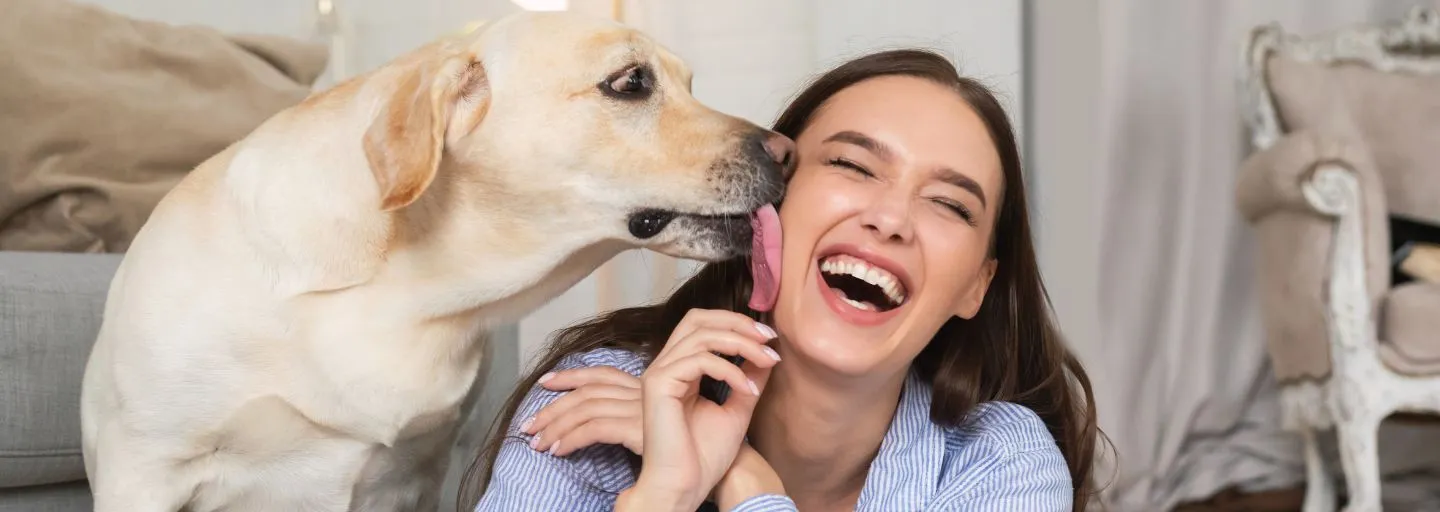In a world where dogs have become an integral part of family life for millions of people, their habits often seem like charming mysteries. But beneath the simple act of licking lie deep evolutionary roots, neurochemical processes, and even signals about health. According to recent research, licking is not just a manifestation of love but a complex communication strategy rooted in the wild ancestors of dogs. However, when this habit becomes compulsive, it may signal problems, requiring owners’ understanding and action. In this article, we will explore reasons you may not have known about and provide expert advice on how to deal with excessive licking — all based on scientific data and real cases.
Why do dogs lick their owners: reasons you didn't know
Dogs lick people for various reasons, most often as an inherited instinct passed down from wolves. Puppies in the wild lick the faces of their mothers to prompt them to regurgitate food — a basic survival mechanism preserved into adulthood as a form of submission or solicitation. But modern research shows that it’s not only about genetics. According to Dr. Julia Albrecht, a veterinarian from PetMD, dogs lick humans to express attachment, communicate, groom, explore, attract attention, and even because of the taste of salt on the skin. My conversations with experts from the American Veterinary Medical Association confirm that this is an evolutionary adaptation where licking acts as a social glue, similar to how primates groom each other.
If licking becomes compulsive, it's important to understand its nature to respond appropriately — otherwise, you risk amplifying the problem. Licking can also be a way of exploring the world: dogs perceive information through taste and smell, sensing salt, cosmetics, or even traces of food on your skin. Research from Discover Magazine indicates that this act releases oxytocin — the "love hormone" — in both the dog and the owner, enhancing emotional bonding. In interviews with neurobiologists from Emory University, I learned that dogs with high stress levels often lick more because it releases endorphins, providing temporary calming similar to human "nervous eating."
Moreover, dogs quickly realize that licking attracts attention — even negative responses, such as pushing away, are a form of interaction for them. Experts from Trupanion emphasize that this may be an expression of empathy when a dog "comforts" its owner by sensing their mood, or a signal of health issues if they detect unusual odors, like from an infection. In extreme cases, such as OCD (obsessive-compulsive disorder), licking becomes pathological — cases have been observed in shelters in New York where dogs lick themselves to wounds.
How to stop a dog from compulsive licking
To train a dog to stop undesired licking, experts recommend using ignoring and redirection techniques — based on positive reinforcement principles developed by behavioral psychologists like Karen Pryor. As soon as your dog starts licking, do not touch or look at them; deliberately turn away or leave the room. The American Kennel Club (AKC) suggests starting with the "sit" command to interrupt the behavior, then rewarding calm responses with praise or treats.
If ignoring doesn't work, stand up and leave the room — this teaches the dog that licking results in a loss of attention. Reward appropriate behavior: when the dog stops licking, give attention, praise, or a treat. Try redirecting your pet's focus with play, offering a toy or a food puzzle like a treat-dispensing toy — which provides an outlet for their natural need to lick, as specialists from Vitapet note. For persistent cases, veterinarians from PetMD recommend checking for medical causes such as allergies or anxiety, and using calming supplements or even bitter sprays on the skin. There have also been cases where regular walks and mental stimulation, such as scent games, reduced licking by 70%.
Car trap: heat endangers animals' lives, and owners face fines
In addition to daily habits, owners must remember seasonal risks. With the arrival of heat, leaving animals in a closed car becomes a deadly trap: interior temperatures can rise to 50°C in mere minutes, causing heatstroke, organ damage, and death. According to the ASPCA, this is illegal in 32 U.S. states, with penalties ranging from hundreds of dollars in fines to imprisonment for animal cruelty. In some states, like California, it can be a felony with fines up to $20,000, and at the federal level — a crime against animals. Our insider sources from the Humane Society emphasize that even with windows open, the risk is fatal. If you see such a situation, call the police — it may save the animal's life.
In a world where dogs are our most loyal companions, understanding their behavior makes coexistence harmonious. If your dog licks too often, consult a veterinarian: better to prevent than to regret.


